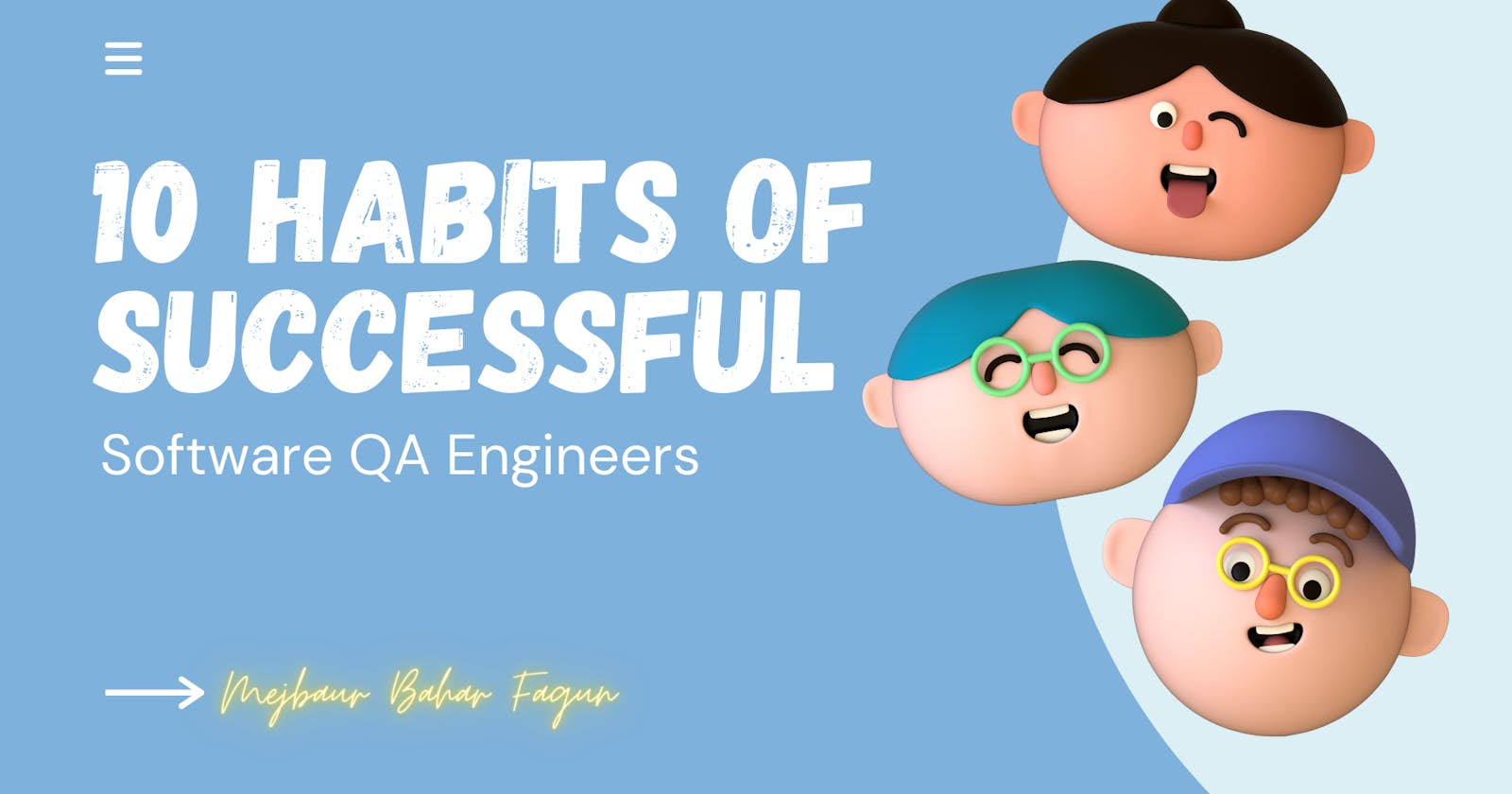10 Habits of Successful Software QA Engineers
Unlocking the Secrets to High-Performance Quality Assurance
Software quality assurance (SQA) engineers and software testers play a crucial role in the development of high-quality software. Their responsibilities include finding and reporting bugs, verifying that software meets the required specifications, and ensuring that the end product is user-friendly and functional. To be successful in this field, software QA engineers and software testers need to develop and maintain certain habits.
Attention to detail: This is one of the most important habits for software QA engineers and software testers. They need to pay close attention to even the smallest of details, as a minor bug can cause a major problem in the software.
Proactivity: Software QA engineers and software testers need to be proactive in identifying potential problems and bugs before they occur. They should have a strong understanding of the software development process and be able to anticipate issues that may arise.
Effective communication skills: Software QA engineers and software testers need to communicate effectively with their team, developers, and stakeholders. They need to be able to clearly explain issues and provide detailed information to help others understand and resolve problems.
Organization: Software QA engineers and software testers need to be well-organized, as they often work on multiple projects at once. They should keep detailed records of their testing results, bugs, and their resolutions.
Continual learning: Technology is constantly evolving, and software QA engineers and software testers need to be up-to-date with the latest tools, techniques, and trends in the field. They should strive to continually improve their skills and knowledge.
Collaboration: Software QA engineers and software testers should work closely with their development team and stakeholders to understand the requirements and goals of the project. By collaborating effectively, they can ensure that testing efforts align with the overall project objectives.
Flexibility: The software development process is often unpredictable, and software QA engineers and software testers need to be flexible in their approach. They should be able to adapt to changes in requirements and be open to new ideas and suggestions.
Methodical approach: Software QA engineers and software testers need to follow a systematic and methodical approach when testing software. They should have a set of procedures and processes in place to ensure that testing is thorough and comprehensive.
Curiosity: Software QA engineers and software testers need to be curious and have the desire to explore and understand how the software works. They should be eager to learn about new technologies and tools that can improve their testing efforts.
Focus on the user: Ultimately, software QA engineers and software testers are responsible for ensuring that the end product is user-friendly and functional. They should focus on the user experience and constantly seek feedback to make improvements.
In conclusion, software QA engineers and software testers play a critical role in ensuring the quality of software. To be successful in this field, they need to develop habits such as attention to detail, proactivity, effective communication skills, organization, continual learning, collaboration, flexibility, a methodical approach, curiosity, and a focus on the user. By focusing on these habits, software QA engineers and software testers can ensure that software is high-quality, functional, and meets the needs of users and stakeholders.
🔀 𝐂𝐨𝐧𝐧𝐞𝐜𝐭 𝐖𝐢𝐭𝐡 𝐌𝐞
𝐅𝐚𝐜𝐞𝐛𝐨𝐨𝐤: https://lnkd.in/dQhnGZTy
𝐅𝐚𝐜𝐞𝐛𝐨𝐨𝐤 𝐏𝐚𝐠𝐞: https://lnkd.in/gaSKMG2y
𝐈𝐧𝐬𝐭𝐚𝐠𝐫𝐚𝐦: https://lnkd.in/gid7Ehku
𝐌𝐞𝐝𝐢𝐮𝐦: https://lnkd.in/gP6V2iQz
𝐆𝐢𝐭𝐡𝐮𝐛: https://github.com/fagunti
𝐘𝐨𝐮𝐓𝐮𝐛𝐞: https://lnkd.in/gg9AY4BE
#SoftwareQualityAssurance #SoftwareTesting #QAEngineer #TesterHabits #SuccessfulTesting #BugBusting #ProactiveTesting #EffectiveCommunication #OrganizedTesting #ContinuousLearning #CollaborativeTesting #FlexibleTesting #MethodicalTesting #CuriousTesting #UserFocusedTesting #QualityMindset #SoftwareQA #TestingBestPractices #TestingEfficiency #DebuggingSkills #UserExperience #SoftwareReliability #SoftwarePerformance #TestAutomation #TestingMethods #SoftwareDevelopment #TestingProcess #TestingGoals #SoftwareSuccess #QATechniques #BugFreeSoftware #SoftwareStability #TestingTools #TestingStrategy #QARolesAndResponsibilities #ContinuousIntegration #SoftwareRequirements #SoftwareDeployment #TestCases #SoftwareMaintenance #TestingEfforts #TestCoverage #SoftwareDefects #SoftwareRelease #TestingMetrics #QAQualityControl #SoftwareIntegrationTesting #SoftwareAcceptanceTesting #TestDriveDevelopment #TestPlanning #TestingMethodologies #TestManagement #DefectTracking #SoftwareRegressionTesting #TestDocumentation #SoftwareDebugging #TestingEfficiencyImprovement #TestingBestPracticesImplementation #TestAutomationFramework #SoftwareTestDesign #QAProfessionalism #SoftwareQAProcess

